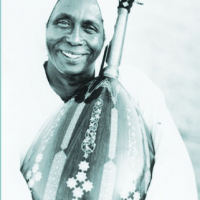Hamza El Din, who has made his life's work reinterpreting the songs of his native region of Nubia on the oud, performed intense music with extreme quietude at Symphony Space on Saturday night...
Ben Ratliff The New York Times, Reviews, March 2, 1999
Music doesn't get much starker than the songs of Hamza El Din, the Nubian musician who performed Saturday night at the Triplex Theater .... He is a virtuoso, but one who uses his technique toward clarity rather than display.
Jon Pareles The New York Times, Reviews, April 19, 1989
(Hamza) began to evolve new musical forms by drawing the moods and colors of Nubian music into the vast technical and aesthetic structure of Arabic classical music. The result is not a loose amalgamation of tow variant forms of music but an entirely new mode of expression. What is especially significant is his full command of the technical possibilities of the Oud combined with new musical patterns and ideas, growing out of the vocal music and drumming of traditional Nubia.
Elizabeth Fernea, Liner notes of Escalay: the Water Wheel, Nonesuch 1998
Read more
Hamza El Din, who has made his life's work reinterpreting the songs of his native region of Nubia on the oud, performed intense music with extreme quietude at Symphony Space on Saturday night...
Ben Ratliff The New York Times, Reviews, March 2, 1999
Music doesn't get much starker than the songs of Hamza El Din, the Nubian musician who performed Saturday night at the Triplex Theater .... He is a virtuoso, but one who uses his technique toward clarity rather than display.
Jon Pareles The New York Times, Reviews, April 19, 1989
(Hamza) began to evolve new musical forms by drawing the moods and colors of Nubian music into the vast technical and aesthetic structure of Arabic classical music. The result is not a loose amalgamation of tow variant forms of music but an entirely new mode of expression. What is especially significant is his full command of the technical possibilities of the Oud combined with new musical patterns and ideas, growing out of the vocal music and drumming of traditional Nubia.
Elizabeth Fernea, Liner notes of Escalay: the Water Wheel, Nonesuch 1998
El Din establishes a skittering rhythm and a melody alternately intoned by oud or voice. The melodies come and go with microtones and scales...
SF Weekly, Music Reviews, February 18-24,1998.
Hamza El Din is a world music giant, an international emissary of Nubian music and culture and an artistic pioneer in the recording of world music.
Rhythm Music Magazine, October 1997.
His playing, rich in overtones, is more relaxed, subtle and intricate than that of the typical oud virtuoso.
San Francisco Chronicle, July 7, 1996
A warm cloud of silence seems to envelop the hall whenever this Nubian born Tokyo resident comes to town, A few impossibly elegant beats on his tar frame drum, some timeless notes plucked from an oud, or a couple of reedy vocal phrases, and you're off to a virtual Upper Nile desert. A more exquisite and less taxing holiday would be tough to conjure.
Village Voice, (New York) March 8, 1994
Hamza El Din is one of the greatest ambassadors for Nubian and Egyptian culture ... [his] sound is so rich that it is sometimes hard to believe that only one man is playing.
Al Ahram, (Cairo) January 20-26, 1994.
This was not some sort of exotic ethnic music, these were the songs and instrumental pieces of a great composer, steeped in the musical language of his Nubian heritage and gifted with the power to transform it into a shapely, sophisticated art form without destroying its own sense of place.
LA Weekly, September 3-9, 1993.
Bypass this rare solo performance only at risk of extreme cultural impoverishment.
San Francisco Bay Guardian, February 5, 1992.
In a harrowing beautiful 12-minutes piece called" Water Wheel" Sudanese born musician Hamza El Din creates a lament for his village, which was flooded, and its people forced to relocate, after the Aswan High Dam was built.
Entertainment Weekly, February 28, 1992.
...El Din was renowned long before the new generation of hip young world music buffs "discovered" his haunting rhythm and surging lyrical instrumentals.
Pacific Sun, February 7,1992.
The Sudan has not figured prominently in the most faddish recent preoccupations with world music, but native son, Hamza El Din, has been an important influence in the reclamation and forward progression of indigenous Nubian traditions. In addition to mastering the TAR, he adopted the OUD and became virtuoso, playing in the both its traditional as an accompaniment to mesmerizing, chant like singing and as solo instrument.
The SF Bay Guardian, Critic's Choice, January 2, 1992
...Hamza's soaring lyrics, sang in the ancient Nubian Language, and his droning 'Ud hauntingly evoke the spirit of his home land.
Louis Werner, Aramco World, July-August, 1992.
He sang and played in masterful form...
The Japan Times, (Tokyo), November 13,1988.
Show less














